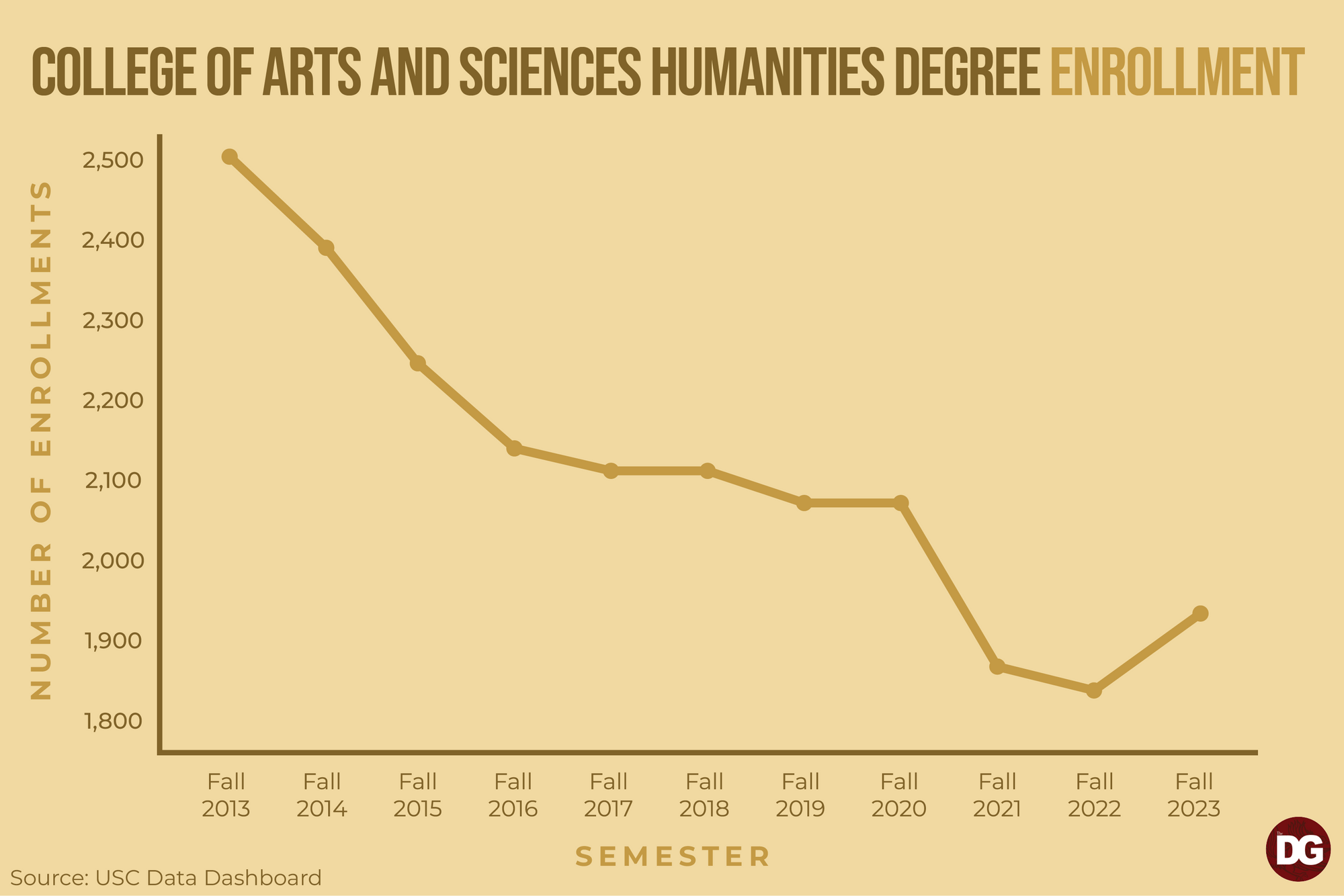The Humanities Collaborative, a group of faculty sponsored by the College of Arts and Sciences, supports cross-departmental research in the humanities through research groups, events, and other programming.
This support is part of its mission to "advance interdisciplinary humanistic inquiry" among faculty and students.
Many public universities, such as West Virginia University and Eastern Kentucky University, have recently reduced funding for humanities programs and cut some departments completely as a part of a "crisis" in the humanities industry.
The crisis is multifaceted, Associate Director of the Humanities Collaborative Maureen Ryan said. The decline in funding for humanities-related programs has contributed to the crisis particularly among state universities, Ryan said.
The humanities are thriving at USC and the College of Arts and Sciences has the largest undergraduate enrollment at the university, Ryan said.
"It's a real crisis, but it's also kind of manufactured," Ryan said. "It's a vibrant place. There's a lot going on. Students certainly end up in a variety of professions. And so I think the college recognizes that we are kind of a powerhouse at the university, and that one way we can kind of showcase that as well as further fund it and propel it to new heights is to have a humanities collaborative."
Former Dean of the College of Arts and Sciences Lacy Ford named the committee that formed the Humanities Collaborative.
Though the College of Arts and Sciences may have a large undergraduate enrollment, Ford said that the number of majors in the humanities has been steadily shrinking.
"There was a concern, I certainly share that concern as a historian, that the insight and ingenuity that humanities can create was going to be lost in the struggle... and so I wanted us to have something that we could do to concentrate some resources that might produce some excitement," Ford said.
The Humanities Collaborative was founded in January 2021, although their events and research programs began the next year because of the COVID-19 pandemic.
The group was awarded a $500,000 grant from the Mellon Foundation for “Civic Engagement, Voting Rights, and the Founding Documents at the University of South Carolina” to begin in fall 2023. This is the first time the university has been awarded a Mellon grant and is the first grant given to the collaborative.
This initiative seeks to enrich the university's understanding of and instruction on the founding documents. With support from the Mellon grant, the Humanities Collaborative will host conferences, a speakers’ series, seminars for faculty teaching founding documents courses and student debates.

The REACH Act, which became law on April 18, 2021, requires that undergraduate students at all South Carolina public institutions complete at least three semester credit hours of a course that teaches “the major events and turning points of American history and government” with required readings.
USC's founding documents requirement fulfills this obligation, with some of the required readings including the United States Constitution, the Emancipation Proclamation and one or more documents related to "the African American Freedom struggle."
Director of the Humanities Collaborative Holly Crocker sought the Mellon Grant to support programming related to the documents.
“We’re trying to embrace the founding documents and to make something creative and intellectual of it," Crocker said.
Though the collaborative is part of the College of Arts and Sciences, it also works with schools outside of the college, such as the School of Music and the Joseph F. Rice School of Law. The collaborative sponsors research groups that connect faculty from different disciplines to collaborate on big-picture issues, such as justice.
One such research group will engage in carceral studies, bringing together different schools to understand the social, cultural and political implications of incarceration.
The collaborative also hosts guest lectures and grant workshops to help faculty learn how to acquire research funding.
It has also highlighted faculty work by recently partnering with All Good Books to host a book launch for College of Arts and Sciences faculty Samuel Bagg, Ed Madden and Deena Isom's respective works.
The Humanities Collaborative has amplified the success of the humanities at USC and encouraged interdisciplinary work, Jessica Elfenbein, department chair of the History Department said.
“People are working in really collegial and collaborative ways, and it’s a great model,” Elfenbein said.
Ford said the COVID-19 pandemic negatively affected cross-disciplinary collaboration.
“The nature of campus collegial life on a disciplinary basis is different post-pandemic than it was when the idea started, and I think it’s a bit harder to bring people together,” Ford said. “I think if we can find ways to bring different humanists together under the Humanities Collaborative, it will have accomplished its purpose in the long term.”
Crocker said some peer institutions had similar programs for 40 years by the time the collaborative was founded. The university's faculty had been trying to start a humanities center at USC for about a decade before its founding two years ago, Crocker said.
The crisis in the humanities may have prompted the College of Arts and Sciences to develop the Humanities Collaborative, Crocker said.
At a Faculty Senate meeting on Dec. 6, 2023, University President Michael Amiridis reassured USC faculty that the university would not follow the national trend of universities cutting funding for humanities programs.
“I want to make sure that you understand that we have a commitment to the liberal arts education, and to our humanities and social sciences and arts programs,” Amiridis said. “I want you to know that our fiscal position is very strong.”
Ford said he believes Amiridis is sincere in his support for the humanities.
"Even though his background was engineering, (Amiridis) has been and, I am convinced, will remain a staunch advocate for the humanities," Ford said.
More information about the Humanities Collaborative can be found on its website.

